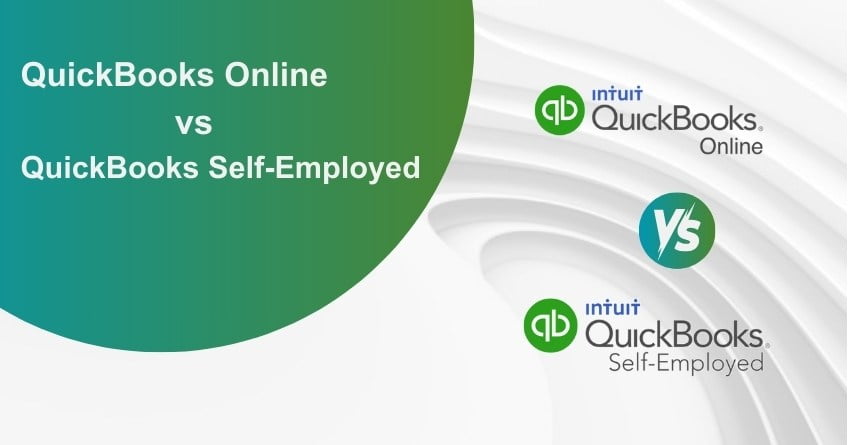Intuit is famous for its brilliant accounting software and two such software are QuickBooks Online and QuickBooks Self-Employed. Both top-notch accounting software caters to distinct user needs and offers varying sets of features. QuickBooks Online is a comprehensive accounting system designed for small and medium-sized businesses. In contrast, QuickBooks Self-Employed is a user-friendly tool tailored for very small businesses without employees. It simplifies the process of tracking income and expenses, making it ideal for freelancers and sole proprietors. In this article, you will find an in-depth analysis of the software “QuickBooks Online vs QuickBooks Self-Employed” with which you can make an informed choice.
QuickBooks Online
QuickBooks Online is a cloud-based financial management software designed to streamline and reduce the time you dedicate to managing your business finances. It accomplishes this by assisting you with various tasks such as invoicing, tracking inventory, payroll, managing customers and suppliers, business with multiple locations and multiple classes of products or services, simplifying tax payments, etc.
QuickBooks Self-Employed
QuickBooks Self-Employed is an accounting software designed exclusively for solopreneurs, and independent contractors. It is a one-stop solution for freelancers and sole proprietors who need help with managing expenses and invoices, keeping tabs on mileage, simplifying quarterly tax payments, generating financial reports, and paying personal and business expenses from the same bank account. You can access QuickBooks Self Employed from mobile apps, giving you the liberty to open your account from remote locations.
Table: QuickBooks Online vs QuickBooks Self-Employed
| QuickBooks Online | QuickBooks Self-Employed | |
| Target Audience | Small businesses with requirements of payroll, inventory tracking, job costing, budgeting, or scalability. | Solopreneurs, independent contractors, freelancers, and sole proprietors. |
| Pricing | $30 to $200 | $15 to $35 |
| Maximum Users | 25 | 1 |
| Bank Reconciliation | Yes | No |
| Send Invoices and Track Collections | Yes | Weak |
| Track Inventory | Yes | No |
| Manage Unpaid Bills | Yes | No |
| Capture and Organize Receipts | Yes | Yes |
| Manage 1099 Contractors | Yes | No |
| Time Tracking | Yes | Yes |
| Track Income and Expenses By Project | Yes | No |
| Track Assets and Liabilities | Yes | No |
| Manage Payroll | Yes | No |
QuickBooks Online vs QuickBooks Self-Employed: A Detailed Comparison
Explore detailed breakdowns of QuickBooks Online and QuickBooks Self-Employed.
1. Pricing
– QuickBooks Online:
| Simple Start | Essentials | Plus | Advanced |
| $30 per month for one user | $60 per month for up to three users | $90 per month for up to five users | $200 per month for up to 25 users |
Apart from the number of users, QuickBooks Online plans also differ in terms of the included features.
– QuickBooks Self-Employed:
| Self-Employed | Self-Employed Tax Bundle | Self-Employed Live Tax Bundle |
| $15 per month for one user | $25 per month | $35 per month |
2. Features
– QuickBooks Online:
It offers a bundle of features essential for small to medium-sized businesses. QuickBooks Online offers a more comprehensive set of features, including invoicing creating and sending invoices, connecting bank accounts, bank reconciliation, tracking assets and liabilities, inviting accountants to access your books, adding payroll, QuickBooks live (Add-on), bank connections, managing and tracking unpaid bills, recording multicurrency transactions, handle inventory, and tracking job profitability.
– QuickBooks Self-Employed:
It does not offer tracking assets and liabilities but other than this it comes with a bunch of necessary features which include creating and sending invoices, connecting bank accounts, and inviting accountants to access your books and bank connections.
3. Accounts Payable
– QuickBooks Online:
With QuickBooks Online you can manage and track accounts payable, and unpaid bills, you can directly use the software to pay your bills and capture expense receipts, create recurring payments, record purchase orders (PO), enter a vendor credit, and pay an independent contractor.
– QuickBooks Self-Employed:
QuickBooks Self-Employed cannot monitor outstanding bills, aka accounts payable.
4. Accounts Receivable
– QuickBooks Online:
This software offers a robust invoicing suite. You can create, personalize, and send invoices with options to add your logo, email, or print them, and choose from various invoice templates. QuickBooks Online goes further by enabling you to send invoice reminders, establish recurring invoices for repetitive billing, generate estimates that can be converted into invoices upon customer acceptance, and monitor accounts receivable aging.
– QuickBooks Self-Employed:
While it allows you to create and send invoices and provides some customization options like logo integration, email, and printing, it has limitations compared to QuickBooks Online. Notably, QuickBooks Self-Employed needs features such as invoice reminders, recurring invoice creation, and the ability to convert estimates into invoices.
5. Reporting
– QuickBooks Online:
It provides a comprehensive range of financial reports. These reports cover a wide spectrum of financial and accounting aspects, making QuickBooks Online suitable for businesses with more complex financial reporting needs including balance sheets, profit and loss (P&L) statements, statements of cash flows, A/R Aging, A/P Aging, income/loss by month, income/loss by customer, income/loss by class, income/loss by project, mileage log, unbilled charges, unbilled time, expenses by vendor, general ledger and trial balance.
– QuickBooks Self-Employed:
QB Self-Employed offers a more limited set of reports. QuickBooks Self-Employed’s reporting options are tailored to the needs of self-employed individuals and freelancers with relatively simpler financial requirements including profit & loss (P&L) statements, statements of cash flows, schedule C worksheets, mileage logs,s and general ledger (CL)
6. Sales and Income Tax
– QuickBooks Online:
QuickBooks Online provides comprehensive features for handling sales and income tax. You can easily include sales tax on your invoices, ensuring accurate and compliant invoicing. Track independent contractors, view sales tax liabilities in detail, pay the sales tax liability, and file sales tax returns.
– QuickBooks Self-Employed:
On the other hand, QuickBooks Self-Employed offers a streamlined set of sales and income tax features designed for self-employed individuals and freelancers. The features include adding sales tax to invoices, tracking independent contractors, viewing sales tax liabilities in detail, estimating quarterly taxes, and making payments which is a crucial feature for self-employed individuals who need to handle their tax obligations.
7. Ease of Use
– QuickBooks Online:
In terms of ease of use, QuickBooks Online, offers more features and customization options including cloud accessibility, setup in a few minutes, shortcut buttons, and unlimited customer support. However, its greater complexity may require a steeper learning curve for some users, especially those who are not familiar with accounting software.
– QuickBooks Self-Employed:
It is designed to be simpler and more user-friendly compared to QuickBooks Online. This simplicity is particularly beneficial for self-employed individuals and freelancers who need basic accounting and tax management capabilities without the complexity of full-fledged accounting software like QuickBooks Online. Cloud accessibility, set up in a few minutes, shortcut buttons, unlimited customer support with the purchase of a live tax bundle
8. Assisted Bookkeeping
– QuickBooks Online:
It offers assisted bookkeeping services which are branded as QuickBooks Live and include a user-friendly dashboard, along with access to expert advisors, account reconciliation, and bookkeeping advice.
– QuickBooks Self-Employed:
QuickBooks Self-Employed also offers an assisted bookkeeping service that connects users with independent QuickBooks ProAdvisors. It also provides access to experts, account reconciliation, and bookkeeping advice to help self-employed individuals manage their finances.
9. Integrations
– QuickBooks Online:
QuickBooks Online offers a robust range of integrations with third-party software with more than 700 apps across various categories. The apps include customer relationship management (CRM), e-commerce, time tracking, and project management. Some popular integrations include PayPal, Shopify, TSheets, Salesforce, HubSpot, Square, and Stripe. It also connects with thousands of apps through Zapier allowing for even more flexibility in integrating with various tools and services.
– QuickBooks Self-Employed:
QuickBooks Self-Employed has a more limited but still relevant set of integrations, such as TurboTax, PayPal, MileIQ, Etsy, and Stripe.
10. Mobile App Functionality
– QuickBooks Online:
QuickBooks Online offers apps for on-the-go access to your financial data and a robust set of features that allow you to issue invoices, accept payments, and enter bills. Provides the ability to assign expenses to customers or projects. You can capture and attach expense receipts. You can enter bill payments, categorize expenses from the bank feed, and record the time worked. Also offers the capability to view reports and track mileage.
– QuickBooks Self-Employed:
QuickBooks Self-Employed’s mobile app is more streamlined and focuses on key features relevant to self-employed individuals, such as invoicing, expense categorization, mileage tracking, capturing expense receipts from the bank feed, and view reports.
11. Customer Support
– QuickBooks Online:
It offers customer support through phone support in plus and advanced, Live chat support, chatbot, Email support, and self-help resources. It also offers a VIP service called QuickBooks priority circle for users with the Advanced plan, which includes a dedicated account team, in-depth training, and 24/7 premium technical support.
– QuickBooks Self-Employed:
QuickBooks Self-Employed offers customer support through Phone support, Live chat support, chatbot, Email support, and self-help resources. It also offers access to a CPA (Certified Public Accountant) for users who sign up for the Live Tax Bundle, which includes assistance with income tax return filing.
Tips on Choosing which one is best – QuickBooks Online vs QuickBooks Self-Employed
Deciding between QuickBooks Online and QuickBooks Self-Employed can be a crucial decision for your financial management, so it’s important to make an informed choice. Here are some tips to help you decide which one is right for you:
1. Assess Your Business Needs
Consider the complexity of your business operations. Do you need more advanced accounting features like inventory management, payroll, or accounts payable? If so, QuickBooks Online may be a better fit. If your needs are relatively simple, such as tracking income and expenses for tax purposes, QuickBooks Self-Employed might suffice.
2. Budget and Cost Considerations
Compare the pricing plans of both software options. QuickBooks Self-Employed is generally more affordable, making it a cost-effective choice for individuals or very small businesses. QuickBooks Online has different pricing tiers, so choose the one that aligns with your budget.
3. Tax Requirements
If your primary concern is managing taxes, QuickBooks Self-Employed is specifically designed for self-employed individuals and freelancers to simplify tax tracking and estimation. It helps with Schedule C tax reporting and calculating quarterly taxes.
4. User Collaboration
If you have a team or want to collaborate with an accountant or bookkeeper, QuickBooks Online allows multiple users. QuickBooks Self-Employed is typically for single users.
5. Invoicing and Billing Needs
If your business relies heavily on creating and sending invoices to clients, QuickBooks Online provides more comprehensive invoicing and billing features.
6. Reporting and Insights
If you need in-depth financial reporting and analytics, QuickBooks Online offers a broader range of reporting options to help you gain insights into your business’s financial health.
Ultimately, your choice between QuickBooks Online and QuickBooks Self-Employed should be based on your business’s current needs, plans, and budget constraints. Consider your priorities and preferences to make the right decision for your financial management.
Conclusion – QuickBooks Online vs QuickBooks Self-Employed
QBO offers robust features and is the better choice for most business owners. QuickBooks Self-Employed, on the other hand, is too basic for all but the smallest businesses and freelancers. QuickBooks Self-Employed might be suitable for freelancers who prioritize a user-friendly interface and seamless integration with TurboTax. In contrast, QuickBooks Online stands out for its high-value accounting features, extensive third-party integrations, and the ability to accommodate additional users. Hope you know everything about both the software to make a decision. If you’re still having issues reaching a decision or have any query please reach out to our support team at +1-855-875-1223.
Frequently Asked Questions (FAQs)
QuickBooks Online and QuickBooks Self-Employed differ significantly in terms of their functionality and target audience. QuickBooks Online is a comprehensive double-entry bookkeeping system designed to track assets, liabilities, income, and expenses for small and medium-sized businesses. In contrast, QuickBooks Self-Employed offers straightforward income and expense tracking.
QuickBooks Self-Employed assists in monitoring your income, expenses, mileage, and tax-related information. You can access your accounts through either a web browser or the mobile app, and your data syncs seamlessly between both platforms, ensuring that your financial information is always up-to-date and accessible from your preferred device.
QuickBooks Self-Employed offers a seamless connection to your bank accounts, simplifying the process of categorizing income and expenses. It also allows you to effortlessly capture and match receipts, send invoices, and automatically track mileage. This streamlined functionality ensures that you are ready for tax time, as it simplifies the tracking and management of financial transactions and documentation.
QuickBooks Self-Employed is specifically designed for freelancers and independent contractors, particularly those who do not maintain separate business and personal bank accounts. It caters to the unique accounting needs of self-employed individuals who may commingle their personal and business finances, offering simplified tools for tracking income, expenses, and taxes in such situations.
The monthly pricing structure for QuickBooks Self-Employed is as follows:
1. Self-Employed: Priced at $15 per month.
2. Self-Employed Tax Bundle: Available for $25 per month.
3. Self-Employed Live Tax Bundle: Offered at a rate of $35 per month.
These pricing tiers provide users with different levels of features and support to cater to their specific accounting and tax needs.
QuickBooks Self-Employed has its limitations, including a lack of extended bookkeeping or accounting features. It can also be challenging to transition to QuickBooks Online, which makes it less scalable for businesses with growing needs. Additionally, some users may find the additional fees for certain tax filings and the monthly subscription costs to be relatively expensive compared to alternative accounting solutions offered by competitors.


